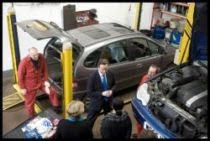Trade in your old banger and you get £2,000 in cash. This, now extended, scheme has no doubt boosted UK car sales over the past 8 months it has been in place, though it appears to have done little to help UK car manufacturers. I can’t see too many rusty old Escorts being towed into Bentley, Land Rover or Aston Martin dealerships.
The move has also been promoted as an environmental initiative, just as it is in America where a scrappage scheme (or 'cash for clunkers' as it is now more commonly known) was, albeit slowly, steered through Congress. The car industry regularly pretends that trading in your old car for a new one is the automotive equivalent of planting a field of daisies.
Now I’m sorry, but the idea of scrapping a perfectly good used car is just plain wasteful, and many of my customers just simply can't afford a new car even with the £2,000 cash incentive. I’ve never bought this bogus argument that it’s greener to regularly buy a new car than it is to hang on to a cherished old timer. Nothing is more environmentally irresponsible than our throwaway culture. If you still like your old car, and it provides noble service, than keep it – no matter what bribes the government may be offering.
Besides, when it comes to research on the ‘whole-life’ energy costs of cars, I would go as far as saying the motor industry is, to paraphrase Churchill, pedalling a lie wrapped in a falsehood inside a fib.
The industry usually claims that the total amount of energy a car consumes throughout its life (and energy consumption is closely linked to CO2 emissions) works out at something like 80% in use (burning fuel) and 20% in manufacturing. So, the industry claims, buying a new car (as long as it’s more fuel economical) helps the planet.
Okay, so my figures are very average, based on a quick 10 minute stats research exercise on Google, but in my opinion where it's 80:20 or 70:30 or whatever, these figures are...skewed. The manufacturing numbers seem to be largely restricted to the energy consumed...at their own factories...during manufacturing and assembly. So they don't include energy used by, for example, their numerous suppliers, total shipping costs (in freighters using carbon-dense marine diesel by the way!) or road freight for all the myriad parts that constitute a modern car. They also do not appear to include the energy consumed by their own workforce commuting to their factories and offices, or the energy used to mine and then transport the raw materials. I'm sure I could think of more, but I trust you get my point.
Add all this up and the environmental picture is a lot hazier. By all means, buy your new car – complete with £2,000 cashback – and enjoy it. There are some great bargains out there, and even one of my mechanics has taken advantage of the scheme. There’s never been a better time to buy. But just don’t pretend you’re doing the Earth any favours!
Jennifer Riach is the owner of MECA Car Services - Exeter's only lady owned & award winning garage offering repairs, servicing & MOTs for all makes of cars, light commercial vehicles, 4x4s & motorhomes. One MECA Car Services' customer says: "Jennifer's Blog is refreshingly honest & funny, looking at the motor trade not only through the eyes of a woman but by one from within the industry".
About Me

- Jennifer Riach
- Exeter, Devon, United Kingdom
- Owner of Exeter's only lady owned award winning independent garage. Recommended by the Good Garage Scheme, Foxy Choice and drivers across Devon.

About MECA Services
Blog Archive

Mt Kilimanjaro

Mt Kilimanjaro camp

Kilimanjaro summit

Blogroll


DC at MECA


Subscribe To


FSB Awards

Followers
MECA




No comments:
Post a Comment